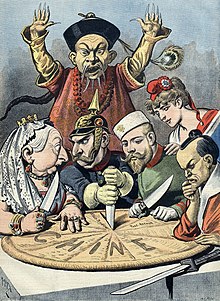Today I learned:
- The First Opium War (1839–42), also known as the Opium War and as the Anglo-Chinese War, was fought between Great Britain and China over their conflicting viewpoints on diplomatic relations, trade, and the administration of justice for foreign nationals.[3]Prior to the conflict Chinese officials wished to end the spread of opium, and confiscated around 20,000 chests of opium (approximately 1.21 million kilograms or 2.66 million lb)[4] from British traders. The British government, although not officially denying China's right to control imports of the drug, objected to this seizure and used its military power to enforce violent redress.[3]In 1842, the Treaty of Nanking—the first of what the Chinese later called the unequal treaties—granted an indemnity to Britain, the opening of five treaty ports, and the cession of Hong Kong Island, thereby ending the trade monopoly of the Canton System. The failure of the treaty to satisfy British goals of improved trade and diplomatic relations led to the Second Opium War (1856–60).[5] The war is now considered in China as the beginning of modern Chinese history.[6][7]......
There was an insatiable demand for tea in Britain. Only silver was accepted in payment by China for tea which resulted in chronic trade deficits.[8] A trade imbalance came into being that was highly unfavourable to Britain. The Sino-British trade was dominated by high-value luxury items such as tea (from China to Britain) and silver (from Britain to China), to the extent that European gold and silver became widely used in China.[9]
...
By 1817, the British decided that counter-trading in a narcotic drug, Indian opium, was a way to reduce the trade deficit and to turn the Indian colony profitable.
The national crisis was widely seen as being caused by foreign aggression.[6] Foreign powers had defeated China in several wars, asserted a right to promote Christianity and imposed unequal treaties under which foreigners and foreign companies in China were accorded special privileges, extraterritorial rights and immunities from Chinese law, causing resentment and xenophobic reactions among the Chinese. France, Japan, Russia and Germany carved out spheres of influence, so that by 1900 it appeared that China would likely be dismembered, with foreign powers each ruling a part of the country. Thus, by 1900, the Qing dynasty, which had ruled China for more than two centuries, was crumbling and Chinese culture was under assault by powerful and unfamiliar religions and secular cultures.[23]
...
International tension and domestic unrest fueled the spread of the Boxer movement. First, a drought followed by floods in Shandong province in 1897–1898 forced farmers to flee to cities and seek food. As one observer said, "I am convinced that a few days' heavy rainfall to terminate the long-continued drought... would do more to restore tranquility than any measures which either the Chinese government or foreign governments can take."[13]
A major cause of discontent in north China was missionary activity. The Treaty of Tientsin (or Tianjin) and the Convention of Peking, signed in 1860 after the Second Opium War, had granted foreign missionaries the freedom to preach anywhere in China and to buy land on which to build churches.[14] On 1 November 1897, a band of armed men who were perhaps members of the Big Swords Society stormed the residence of a German missionary from the aggressive Society of the Divine Word and killed two priests. This attack is known as the Juye Incident. When Kaiser Wilhelm II received news of these murders, he dispatched the German East Asia Squadron to occupy Jiaozhou Bay on the southern coast of the Shandong peninsula.[15] Germany's action triggered a "scramble for concessions" by which Britain, France, Russia, and Japan also secured their own sphere of influence in China.[16]
A French political cartoon depicting China as a pie about to be carved up by Queen Victoria (Britain), Kaiser Wilhelm II (Germany), Tsar Nicholas II (Russia), Marianne (France) and a samurai (Japan), while a Chinese mandarin helplessly looks on.
...
Sources: http://en.wikipedia.org/wiki/Boxer_Rebellion and http://en.wikipedia.org/wiki/First_Opium_War

No comments:
Post a Comment